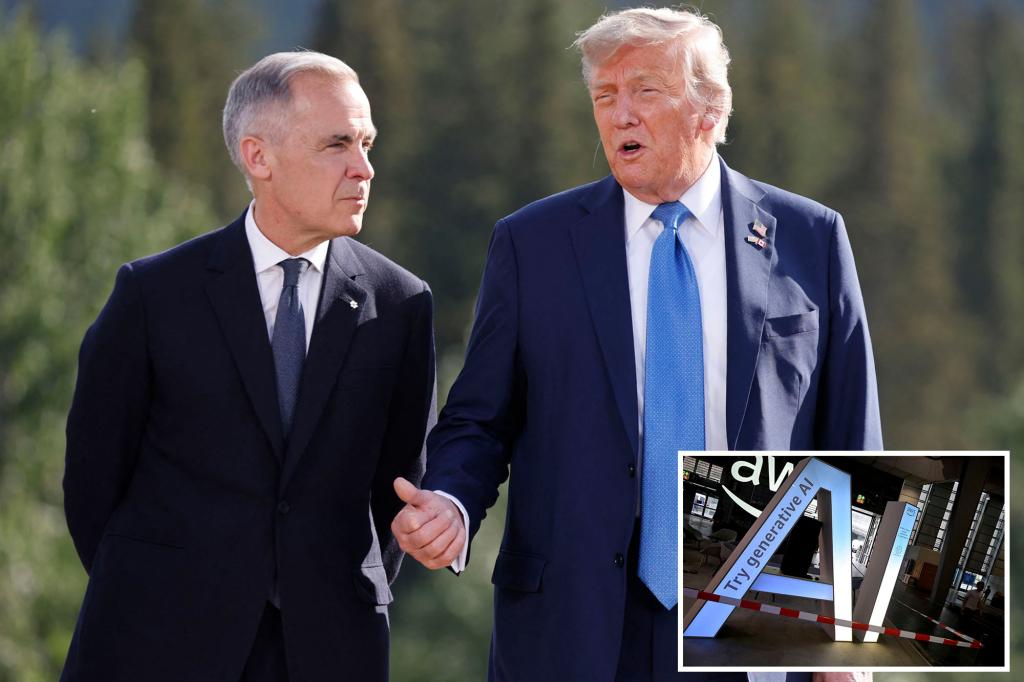
Canada has unexpectedly withdrawn its plan to impose a digital services tax on American technology companies, just days after former President Donald Trump criticized the measure as a “direct and blatant attack” on the United States. This decision was made by Canadian Prime Minister Mark Carney mere hours before the tax was set to be implemented on Monday, as Canada seeks to revive stalled trade negotiations ahead of a critical July 21 deadline.
The announcement comes after Trump abruptly ended trade talks on Friday, following Canada’s insistence on imposing a 3% levy on revenue generated by companies such as Amazon, Google, Meta, Uber, and Airbnb from Canadian users. The tax, which would have been applied retroactively, threatened to leave these companies with a $2 billion bill due at the end of the month.
Trade Negotiations in Jeopardy
In response to the proposed tax, Trump vowed to establish a new tariff rate on Canadian goods within the next week, a move that risked further straining US-Canada relations. “We have just been informed that Canada… has just announced that they are putting a Digital Services Tax on our American Technology Companies, which is a direct and blatant attack on our Country,” Trump stated on Truth Social.
“Based on this egregious Tax, we are hereby terminating ALL discussions on Trade with Canada, effective immediately,” Trump declared.
Trump’s comments suggested a potential escalation in trade tensions, reminiscent of past disputes between the two nations. He later expressed confidence that Canada would reverse its decision, citing the economic leverage the US holds over its northern neighbor.
Canada’s Strategic Retreat
Prime Minister Carney’s office revealed that he spoke with Trump on Sunday night and agreed to suspend the tax to facilitate the resumption of trade talks. Finance Minister François-Philippe Champagne is now tasked with introducing legislation to formally rescind the tax, according to a statement from Canada’s finance ministry.
The digital services tax was initially announced in 2020 as a measure to ensure that large technology companies operating in Canada would pay taxes on revenues generated from Canadian consumers. However, Canada’s preference has always been for a multilateral agreement on digital services taxation, as stated by the finance ministry.
Historical Context and Future Implications
This development follows a history of trade tensions between the US and Canada, often marked by disputes over tariffs and trade agreements. The breakdown in talks came after Trump and Carney met at the G7 summit in mid-June, where they had agreed to finalize a new economic deal within 30 days.
Experts suggest that the swift reversal by Canada highlights the significant economic interdependence between the two countries. “The economic ties between the US and Canada are deeply rooted, and any disruption could have far-reaching consequences,” noted trade analyst Sarah Thompson.
According to Thompson, “The decision to halt the tax is a pragmatic move by Canada to avoid a potential trade war.”
Looking ahead, the resumption of trade negotiations later in July will be closely watched by both nations, as they seek to navigate the complexities of their economic relationship. The outcome of these discussions could set the tone for future trade policies and agreements between the US and Canada.
As the situation unfolds, businesses and policymakers on both sides of the border will be keenly observing the developments, with the hope of reaching a mutually beneficial resolution that supports economic growth and stability.






